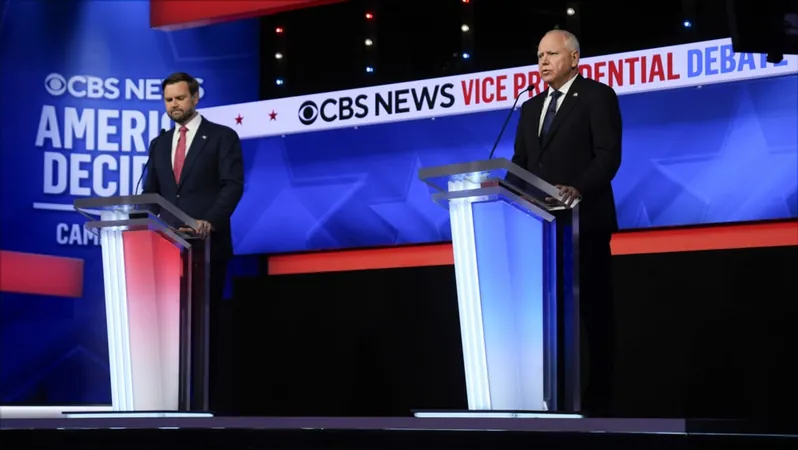
Walz and Vance Face Off in a Tense Yet Civil Vice Presidential Debate
2024-10-02
Author: Jia
NEW YORK: In a surprising turn of events, Democrat Tim Walz and Republican JD Vance engaged in a policy-heavy vice presidential debate on Tuesday, October 1, maintaining a civil but intense atmosphere amid a divisive election campaign. This debate comes as candidates grapple with the fallout from inflammatory rhetoric and two assassination attempts against prominent figures.
Walz, the liberal governor of Minnesota, and Vance, an influential US senator from Ohio, are seen as representing the Midwestern heartland—yet they hold starkly contrasting views on critical national issues. Their exchanges were laced with pointed jabs at their respective running mates: Vice President Kamala Harris and former President Donald Trump.
One of the evening's high-stakes moments occurred when Vance was pressed about whether he would contest this year's election results should Trump suffer a loss. Vance, known for his controversial stance on the 2020 election, sidestepped the query. Walz seized on this evasion, linking Vance's reluctance to Trump's unfounded claims of widespread voter fraud that incited the January 6th Capitol riot. “He is still saying he didn’t lose the election,” Walz stated emphatically, challenging Vance directly on the matter.
For his part, Vance redirected the discussion to criticisms of Harris, particularly regarding her record on inflation and immigration—a theme he hammered as he sought to hold her accountable for inaction during her time in Biden's administration. “If Kamala Harris has such great plans for how to address middle-class problems, then she ought to do them now," he said, echoing sentiments often expressed by Trump.
The debate also delved into pressing international concerns, particularly the escalating crisis in the Middle East, which has seen Israel’s military actions intensify amidst retaliatory strikes from Iran. Walz cautioned that Trump lacks the steady hand required in such delicate situations, while Vance insisted Trump's presidency had made the world safer—a claim that echoed historical divides in U.S. foreign policy.
Both candidates, however, displayed restraint and a dose of Midwestern politeness in their interactions, focused on critiquing their running mates rather than directly attacking each other. This decorum stood in stark contrast to the aggressive tone of previous debates this election cycle, causing some analysts to remark on the unusual civility.
In a moment of self-reflection, Walz also addressed a claim regarding his past in China during the Tiananmen Square protests, admitting to a misstatement, while Vance expressed a change of heart about Trump, acknowledging he was initially misled by the media's portrayal of the ex-president.
As the debate officially wrapped up, polls indicated a tight race ahead of the imminent November 5 presidential election, with the outcome hanging in the balance. Political analysts caution that while vice presidential debates typically have minimal impact on electoral results, any shift in public sentiment could prove pivotal in such a closely contested race.
Interestingly, voter sentiment appears to lean slightly against Vance, whose past as an author—most notably of "Hillbilly Elegy"—has failed to translate positively in current public opinion, with many viewing him unfavorably. Meanwhile, Walz maintains a slight edge among voters, reflecting a growing preference for his political stance and approach.
As the clock ticks down to election day, both candidates will need to leverage this debate effectively to sway undecided voters and solidify their bases in an unprecedentedly polarized environment.



 Brasil (PT)
Brasil (PT)
 Canada (EN)
Canada (EN)
 Chile (ES)
Chile (ES)
 España (ES)
España (ES)
 France (FR)
France (FR)
 Hong Kong (EN)
Hong Kong (EN)
 Italia (IT)
Italia (IT)
 日本 (JA)
日本 (JA)
 Magyarország (HU)
Magyarország (HU)
 Norge (NO)
Norge (NO)
 Polska (PL)
Polska (PL)
 Schweiz (DE)
Schweiz (DE)
 Singapore (EN)
Singapore (EN)
 Sverige (SV)
Sverige (SV)
 Suomi (FI)
Suomi (FI)
 Türkiye (TR)
Türkiye (TR)